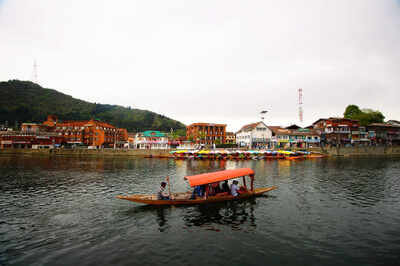- News
- India News
- Jammu and Kashmir economy hit, losses touch Rs 6,000 crore
Trending
This story is from August 24, 2016
Jammu and Kashmir economy hit, losses touch Rs 6,000 crore
From horticulture to hospitality, almost all activities have come to a standstill. There is zero occupancy in hotels, and houseboats and shikaras have been empty for weeks now. Carpets and shawsl are lying unsold in shops across Srinagar. Those in transport say they haven’t seen such bad days.

Tourists are avoiding Kashmir due to the ongoing unrest. (file photo)
SRINAGAR: Almost every business leader in Kashmir will tell you that financial losses are irrelevant compared to the “deaths on our soil“, but even going by a conservative estimate, trade and industry in the region have suffered a huge blow with es timates of losses hovering over Rs 6,000 crore in 45 days of strife.
Mohd Yasin Khan, president of Kashmir Traders and Manufacturers Federation, told TOI the sector is bleeding by approximately Rs 135 crore every day.In the 46 days of curfew it would be upwards of Rs 6,000 crore,“ Mohd Yasin Khan, president of Kashmir Traders and Manufacturers Federation, said.
“We’re facing the worst economic crisis ever, but then this is happening again and again. We need a permanent solution to it and it has to be political. Losing our dear ones is a far greater tragedy for us. That has to stop,” he added.
From horticulture to hospitality, almost all activities have come to a standstill. There is zero occupancy in hotels, and houseboats and shikaras have been empty for weeks now. Carpets and shawsl are lying unsold in shops across Srinagar. Those in transport say they haven’t seen such bad days.
Faiz Bakshi, secretary of Kashmir Chamber of Commerce and Industry, refuses to talk “about monetary issues in these circumstances”. He said, “We will not talk about that now. What we will tell you is that it is time for a final settlement of the Kashmir crisis.”
On the ground, though, things are getting tough. Abdul Rouf Bhat, who sells packaged drinking water, said his firm Pagent Industries used to sell 1,500 cases of his product in the days just before July 8, when the killing of Hizb terrorist Burhan Wani triggered a chain of events that has now led to 67 deaths and 46 days of curfew. “Now I sell 50,” he rued. Bhat said he has been paying only 50% wages to workers. “But how long can I continue? Even that will have to stop. They know this. They also know I am helpless.”
Basharat Ahmad, the only waterproofing applicator in Kashmir, said five cheques given to him by his clients have bounced. “Nobody is releasing payments,” he added. “And I know I can’t push them right now. The floods of September 2014 took away a lot. But 2015 looked better and I took huge loans. I am stuck.”
This is apart from what the unrest has had on Jammu’s economy, roughly about `1,000-1,500 crore, according to the Jammu Chamber of Commerce and Industries. The current predicament has visited the valley barely two years after massive floods, causing the economy to lose close to `5,400-`5,700 crore in revenue.
Mohd Yasin Khan, president of Kashmir Traders and Manufacturers Federation, told TOI the sector is bleeding by approximately Rs 135 crore every day.In the 46 days of curfew it would be upwards of Rs 6,000 crore,“ Mohd Yasin Khan, president of Kashmir Traders and Manufacturers Federation, said.
“We’re facing the worst economic crisis ever, but then this is happening again and again. We need a permanent solution to it and it has to be political. Losing our dear ones is a far greater tragedy for us. That has to stop,” he added.
From horticulture to hospitality, almost all activities have come to a standstill. There is zero occupancy in hotels, and houseboats and shikaras have been empty for weeks now. Carpets and shawsl are lying unsold in shops across Srinagar. Those in transport say they haven’t seen such bad days.
“Seventy per cent of apples that India gets are from Kashmir,” a businessman said. “Imagine the situation in the orchards. Farmers have sent their labourers home, but what do they do in places like Sopore, Tarzoo and Anantnag, where the situation is worse?”
Faiz Bakshi, secretary of Kashmir Chamber of Commerce and Industry, refuses to talk “about monetary issues in these circumstances”. He said, “We will not talk about that now. What we will tell you is that it is time for a final settlement of the Kashmir crisis.”
On the ground, though, things are getting tough. Abdul Rouf Bhat, who sells packaged drinking water, said his firm Pagent Industries used to sell 1,500 cases of his product in the days just before July 8, when the killing of Hizb terrorist Burhan Wani triggered a chain of events that has now led to 67 deaths and 46 days of curfew. “Now I sell 50,” he rued. Bhat said he has been paying only 50% wages to workers. “But how long can I continue? Even that will have to stop. They know this. They also know I am helpless.”
Basharat Ahmad, the only waterproofing applicator in Kashmir, said five cheques given to him by his clients have bounced. “Nobody is releasing payments,” he added. “And I know I can’t push them right now. The floods of September 2014 took away a lot. But 2015 looked better and I took huge loans. I am stuck.”
This is apart from what the unrest has had on Jammu’s economy, roughly about `1,000-1,500 crore, according to the Jammu Chamber of Commerce and Industries. The current predicament has visited the valley barely two years after massive floods, causing the economy to lose close to `5,400-`5,700 crore in revenue.
End of Article
FOLLOW US ON SOCIAL MEDIA










